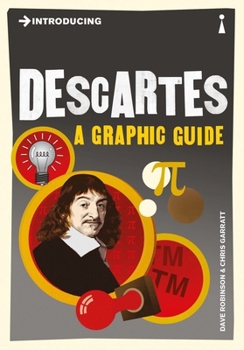Descartes for Beginners
(Part of the Graphic Guides Series and Introducing Graphic Guides Series)
Select Format
Select Condition 
Book Overview
Ren Descartes is famous as the philosopher who was prepared to doubt everything- even his own physical existence. Most people know that he said 'I think, therefore I am', even if they are not always sure what he really meant by it.
Format:Paperback
Language:English
ISBN:1848311729
ISBN13:9781848311725
Release Date:November 2010
Publisher:Icon Books
Length:176 Pages
Weight:0.38 lbs.
Dimensions:0.5" x 4.6" x 6.5"
Customer Reviews
5 ratings
More than you cared to know about the "I think therefore I am" guy
Published by Thriftbooks.com User , 17 years ago
It's an easy going read and quite informative, but I felt they stretched it a bit to make a full book out of his work. Could have been half the length, I think.
Cogito ergo Sum - I think therefore I am
Published by Thriftbooks.com User , 18 years ago
Descartes is responsible for discovering a series of explanations for the Cogito. Descartes is mainly good at asking the right questions, getting the maths right, but his philosophies are a series of stepping stones that although quite forgotten today were useful tools for the dawn of scientific theory. For this reason Descartes is best taken with `Introduction to Newton and classical physics' for the pre-Newton physics thoughts, although it works well enough as a standalone. This is also the era of pre-psychoanalysis at the basic level. Descartes, a Frenchman, was sickly as a child and was allowed to stay in bed until early afternoon. He learned Greek and Latin and music. He spent his teens and early 20s in the army. In the winter of 1619 he was snowed in and spent the months just thinking to himself in his room about the mind. He had a number of what he believed were prophetical dreams, moved to Holland, rejected that theism could explain the mind (although he believed in a God), got interested in Galileo's experiments, and decided to experiment on the mind. Core criteria: Reduction in mathematics Rejecting final cause Clear ideas in a cleared mind The modes of wax Rationalists and empiricists Scepticism Consequences and death Cartesian doubt Dreams Rationalists and reason Invisible demons and the God filter Impossibility of private language Cogito ergo Sum - I think therefore I am Ontological argument Meditations on perception Mathematics Formalists Res Extensa Vivisections Cartesian dualism Language Brains The mind body problem Consciousness Behaviourists Physicalists Computers Ethics The thinking individual Postmodernism This is a great part of the history of psychology and physics. The only problem is that it is missing a better reference with evolution which would help explain many of the problems we are left with. This is part of what happens when you read Descartes because it is part of the historical record and has since been improved upon by Newton in physics and Fraud in psychology.
you'd think people know how this series works by now
Published by Thriftbooks.com User , 23 years ago
This is a perfect read for the layman who maybe doesn't have long periods of time to devote to reading who has the desire to learn about the father of modern philosophy and its problem of consciousness. I easily completed this book within one afternoon. Though it has a typical amount of pages, the comic-like format turns the read into a swift breeze filled with humor and creativity. It begins with explaining why Descartes is the father of modern philosophy, namely that he thought for himself (in a departure from Scholasticism). Though he retained Christian belief throughout his life, he was a very rational and mathematically minded person in the field of science that he managed to keep secular in practice, though it would ultimately be verified on God the Geometer's grounds. Aside from his biography, this Cartesian exordium lays out the philosophy of mind and all of the perspectives on it. (dual aspect monism, occasionalism, epiphenomenalism, materialism, functionalism, behaviourism, cognitivism and pyschophysical parallelism--for some more recent takes on the ghost in the machine I recommend Colin Mcginn's "The Mysterious Flame") Inevitably these talks bring up the issue of artificial intelligence and conscious automata.Obviously like any other book in the "Introducing" series this book is simple, general, and fun, but at the same time comprehensive and a great starting point.
Introducing Descartes: an invitation into thought
Published by Thriftbooks.com User , 24 years ago
Perhaps one of the largest criticism of the entire series of these books is the lack of depth. I find this a strength. Already fairly familiar with Descartes I found this book to cover a broad scope of theories related to Descartes'. Admittedly there are points where depth could be needed. I think though that the people that complain about depth, are the same people who need to be spoon-fed how to think. I found that the work, made me ponder about some of the issues put forth by it. So if you want to be spoon-fed opinion, and then consider yourself an "intellectual." Then by all means avoid this book, and find something more detailed. However if you feel you are capable of deeper INDEPENDANT thought, but simply need a starting point, this is a must have.
EXCELLENT FOR BEGINNERS
Published by Thriftbooks.com User , 24 years ago
I didn't know much about Descartes before, so I bought this book and it is great for beginners. It also has some funny illustrations. If you don't know anything about his ideas, apart from "I think, therefore I am", you will enjoy this book. Otherwise, if you think you're a little more advanced, then read "Descartes: the great philosophers" by John Cottingham.






